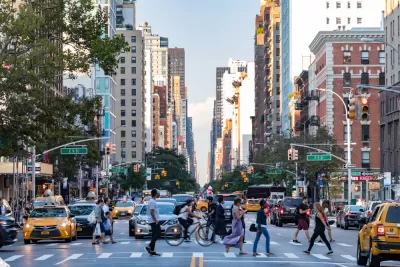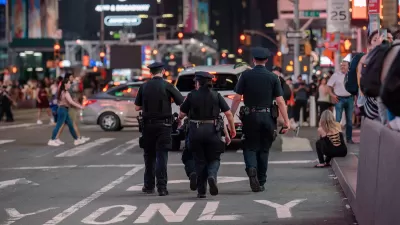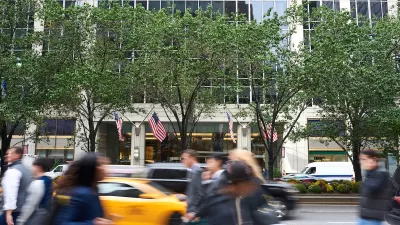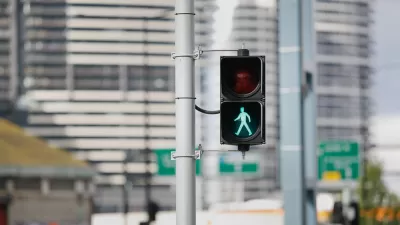For the first time since 1958, pedestrians in New York City are free to cross the street without adhering to traffic signals or marked crosswalks.

For New York City locals, jaywalking has long-standing — but illegal — practice. But, according to a CNN article by Julianna Bragg, pedestrians in the Big Apple can now, for the first time since 1958, legally cross the street at any time without adhering to traffic signals. The change was made official last week after Mayor Adams neither signed nor vetoed the bill legalizing jaywalking that the city council passed in September.
“Supporters of the bill, including one of the sponsors, Council Member Mercedes Narcisse, believe this legislation is a step toward improving racial justice. New York police officers have historically faced criticism for targeting people of color with jaywalking tickets,” Bragg writes. StreetsblogNYC reported back in May that 92 percent of jaywalking tickets issued in New York City in 2023, which carry up to a $250 fine, were issued to Black and Latino pedestrians.
NYC city officials and police officers initially came out against the bill as it was being considered earlier this summer. The police argued that ticketing jaywalking helps reduce traffic deaths. Bragg reports that over the past five years 200 people have died while crossing the street in the middle of the blog or against traffic signals, accounting for around 34 percent of all pedestrian fatalities. But, as explained by Peter Norton, the 100-year-old effort to first codify “jaywalking” was driven by enterprises with a business interest in automobiles who wanted cars to be the priority road user. Indeed, traffic experts like Angie Schmitt and Charles T. Brown have long argued that jaywalking is a concept developed by auto companies not to keep pedestrians safe but rather to shift the blame away from reckless drivers who kill them.
New York City is now among a handful of states and major U.S. cities that have decriminalized jaywalking in recent years, including California, Virginia, Nevada, Denver, and Kansas City, Missouri.

Alabama: Trump Terminates Settlements for Black Communities Harmed By Raw Sewage
Trump deemed the landmark civil rights agreement “illegal DEI and environmental justice policy.”

Planetizen Federal Action Tracker
A weekly monitor of how Trump’s orders and actions are impacting planners and planning in America.

The 120 Year Old Tiny Home Villages That Sheltered San Francisco’s Earthquake Refugees
More than a century ago, San Francisco mobilized to house thousands of residents displaced by the 1906 earthquake. Could their strategy offer a model for the present?

LA’s Tree Emergency Goes Beyond Vandalism
After a vandal destroyed dozens of downtown LA trees, Mayor Karen Bass vowed to replace them. Days later, she slashed the city’s tree budget.

Sacramento Leads Nation With Bus-Mounted Bike Lane Enforcement Cameras
The city is the first to use its bus-mounted traffic enforcement system to cite drivers who park or drive in bike lanes.

Seattle Voters Approve Social Housing Referendum
Voters approved a corporate tax to fund the city’s housing authority despite an opposition campaign funded by Amazon and Microsoft.
Urban Design for Planners 1: Software Tools
This six-course series explores essential urban design concepts using open source software and equips planners with the tools they need to participate fully in the urban design process.
Planning for Universal Design
Learn the tools for implementing Universal Design in planning regulations.
Ada County Highway District
Clanton & Associates, Inc.
Jessamine County Fiscal Court
Institute for Housing and Urban Development Studies (IHS)
City of Grandview
Harvard GSD Executive Education
Toledo-Lucas County Plan Commissions
Salt Lake City
NYU Wagner Graduate School of Public Service





























